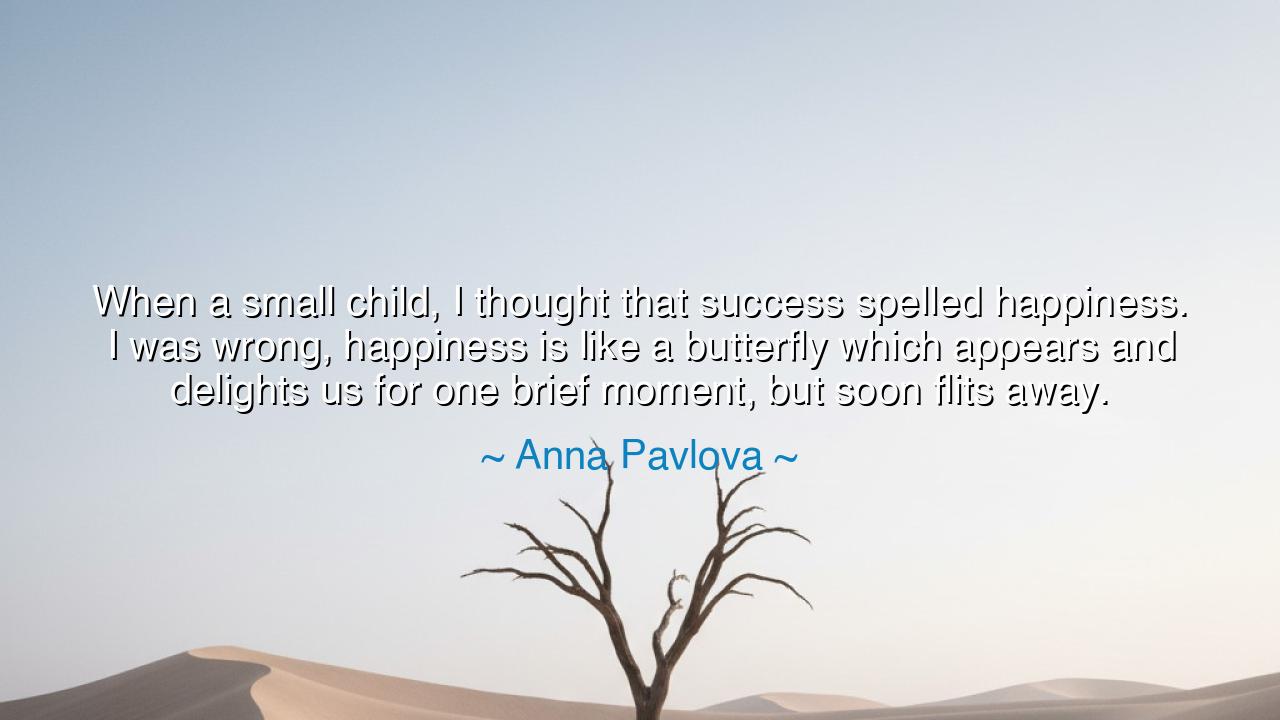
When a small child, I thought that success spelled happiness. I
When a small child, I thought that success spelled happiness. I was wrong, happiness is like a butterfly which appears and delights us for one brief moment, but soon flits away.






The immortal dancer Anna Pavlova, whose feet once whispered across the stages of the world, spoke with haunting beauty when she said: “When a small child, I thought that success spelled happiness. I was wrong, happiness is like a butterfly which appears and delights us for one brief moment, but soon flits away.” In these words lies the sorrow and wisdom of a soul that has tasted both glory and loneliness. Pavlova, who rose from humble beginnings to become one of the most celebrated ballerinas in history, discovered what all seekers of greatness must one day learn — that success and happiness are not the same. One fills the hands, the other fills the heart. And only the heart can tell when it is truly full.
When Pavlova spoke of the butterfly of happiness, she revealed a truth known to poets and sages alike: joy is fragile, fleeting, and beyond our power to command. As a child, she imagined that fame — the thunder of applause, the light of admiration — would bring her peace. But when she achieved all that the world could offer, she found that happiness was not a prize, but a visitor — delicate, unpredictable, and momentary. It would alight upon her life for an instant, shimmering with wonder, and then take flight again. In this, she understood the paradox of human desire: the more we chase happiness, the farther it flies.
The origin of Pavlova’s insight is rooted in her own life of relentless pursuit. Born in poverty near St. Petersburg, she dedicated her every breath to the discipline of dance. Through sweat and sacrifice, she became the embodiment of grace, her movements compared to celestial beings. Yet behind the curtain of triumph, she lived a life of solitude — always traveling, always performing, never still. Her words reveal the ache of one who achieved her childhood dream only to find that success can bring admiration but not contentment, that the applause of others can never silence the longing within.
The ancients, too, understood this lesson. The Greek philosopher Epicurus taught that happiness, or eudaimonia, is not born of wealth or fame, but of tranquility and simple pleasures. The mighty Alexander the Great, who conquered the world before the age of thirty, died restless and unfulfilled, lamenting that there were no more lands to seize. He had all success and none of peace. Like Pavlova’s butterfly, joy had perched upon his hand and flown away, leaving him with the ashes of ambition.
Pavlova’s metaphor of the butterfly teaches us humility before life’s mysteries. Happiness, she tells us, cannot be caught and caged; it must be admired while it visits, and released when it leaves. It is not a constant possession, but a rhythm, like the ebb and flow of the sea. Those who try to trap it destroy its beauty. But those who live with gratitude, aware of its fleeting nature, learn to cherish the moments of light that grace their path. True wisdom lies not in chasing the butterfly, but in creating a garden of peace where it may choose to linger.
Yet her words are not filled with despair — they are filled with truth. For though happiness may flit away, the search for meaning can endure. Pavlova herself found purpose in her art, in the act of giving beauty to the world. Perhaps she understood that while happiness is momentary, devotion can be eternal. The joy of creation, of discipline, of living one’s purpose — these are the lasting roots beneath the fleeting wings of delight. Success may not bring happiness, but a life of passion, integrity, and gratitude can create a quiet joy that does not vanish so easily.
Let every listener take heed, then: do not mistake success for happiness, nor chase joy as if it were a thing to be possessed. Instead, live deeply, love generously, and act with purpose. Let each moment of peace, laughter, or beauty be a sacred gift, not an entitlement. When happiness comes, welcome it like a butterfly landing softly on your shoulder. And when it flies away, smile — for it has touched you, and its memory will remain.
Thus, the teaching of Anna Pavlova endures across time: happiness is fleeting, but meaning is forever. Seek not to trap joy, but to live in such a way that it finds you again and again. For in the dance of life, the truest grace is not in holding on, but in learning how to let go — and to keep dancing even as the butterfly disappears into the golden light.






AAdministratorAdministrator
Welcome, honored guests. Please leave a comment, we will respond soon